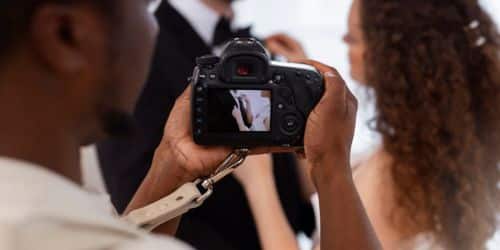In the dynamic realm of photography, safeguarding your business with comprehensive insurance is paramount. Understanding the nuances of photography business insurance costs and seeking the best insurance for photographers from reputable providers like Geico and Progressive ensures a protective shield against unforeseen challenges. Whether you’re exploring Geico photography insurance or considering the advantages offered by Progressive, optimizing your coverage is a vital step in securing the financial stability of your photography venture.
What is Photography Business insurance?
Photography business insurance is a broad term encompassing policies designed to shield photographers and videographers from potential financial liabilities. This multifaceted coverage caters to the diverse challenges that may arise in the realm of professional photography. Whether you’re managing a dedicated photography business or pursuing it as a side endeavor, investing in business insurance is a prudent decision. The rationale lies in the protective umbrella it provides, stepping in to cover expenses resulting from a claim or theft that would otherwise burden your company’s financial responsibilities. This strategic investment ensures the sustained resilience of your photography business, guarding against unforeseen circumstances that could otherwise have a devastating impact.
Photography Business Insurance Cost
Determining the cost of photography business insurance is a nuanced process, influenced by various factors crucial to your unique operations. The scale, nature, and location of your photography business all play significant roles in shaping the overall premium. For photographers engaged in high-risk events or specialized niches, the cost structure may differ from those involved in more conventional photography, impacting insurance expenses. The scale of your business, whether it’s a full-time profession or a part-time pursuit, introduces additional variables that contribute to the complexity of estimating insurance costs.
Furthermore, the value of your photography equipment is a key determinant. High-end gear necessitates higher replacement values, influencing the overall insurance premium. The geographic location adds another layer, considering factors like local crime rates and exposure to natural disasters, both of which contribute to the intricacies of calculating your photography business insurance cost. To navigate this complexity, consulting with insurance professionals ensures tailored coverage aligned with your specific business needs.
Best Insurance for Photographers
Determining the best insurance for photographers depends on individual needs and preferences. However, here are some insurance providers that are often considered reputable for catering to the specific requirements of photographers:
#1Thimble
Thimble stands out among photography insurance providers as it allows you to buy coverage for individual jobs or on a monthly basis. This flexibility enables you to pay for insurance only when necessary, tailoring each coverage period to the specific details of the job.
#2Hill and Usher
Hill & Usher specializes in insurance crafted for videographers, graphic designers, and web designers, ensuring comprehensive coverage for studio contents, camera equipment, liability, and more.
#3The Hartford
The Hartford offers business owner’s policies that can be tailored to include coverage for photographers, encompassing liability, property, and business interruption insurance.
#4Progressive
Despite the inclusion of newer insurance companies in our rankings, Progressive, a veteran in the industry since 1937, stands out. Progressive not only allows direct collaboration with an agent for tailored photography business insurance but also provides the convenience of obtaining online quotes.
#5Full Frame
Full Frame specializes in providing insurance exclusively tailored for photographers and videographers. Focusing solely on creative professionals ensures that any representative you communicate with possesses a deep understanding of the unique nuances within the industry. Before choosing an insurance provider, it’s crucial to assess your specific needs, the nature of your photography work, and your budget.
Geico Photography Insurance
Geico’s Event Cancellation coverage provides reimbursement for forfeited deposits and non-refundable expenses in the event of unforeseen circumstances like vendor bankruptcy, accidents, illnesses, extreme weather, or military deployment. This protection extends to covering extra costs incurred to prevent event cancellation and compensates for various losses such as lost wedding rings, vendor non-attendance, damaged gifts, harm to special event attire, and compromised photography or videography. You can acquire this coverage up to 14 days before your event, with policies starting at just $130.Progressive Photography Insurance
Progressive photography insurance costs are tailored to the unique needs of professional photographers, offering crucial protection against potential financial setbacks. Piloting the diverse coverages is vital, as they act as a safeguard against the significant costs that could arise from unexpected claims. With the Progressive Advantage Business Program, our seasoned experts specialize in aligning your photography business with the ideal insurance coverage, ensuring comprehensive protection.
What Kind of Insurance Do You Need for a Photography Business?
Professional photographers need a comprehensive insurance package, including general liability, professional liability, and camera equipment coverage. For varying operational durations, consider a short-term liability policy for brief events or an annual policy if you conduct frequent sessions throughout the year. Additionally, safeguard your equipment by investing in specific insurance that covers potential loss or damage costs.
What Does Liability Insurance Cover Photography?
Liability insurance shields photographers from damages arising due to service errors or failures. Moreover, if you possess substantial equipment and work on others’ property, general liability insurance becomes crucial for comprehensive coverage. This broader policy ensures financial protection in diverse scenarios, offering peace of mind for photographers navigating various work environments.
Photographers should prioritize liability insurance to mitigate the risks associated with service-related disputes. Furthermore, the need intensifies if you own valuable equipment and conduct shoots on clients’ premises. Opting for general liability insurance provides a broader safety net, encompassing property damage or injury claims that may emerge during your work, reinforcing your overall business resilience.
Read: LLC Business Insurance: What It Means & Why You Need It
Why Would a Photographer Need Insurance?
Embarking on a photography business is a thrilling venture, offering autonomy, creativity, and the chance to capture memorable moments. From studio family portraits to outdoor weddings, each session brings unique experiences, adding to the richness of your profession. As a photographer, ensuring client comfort and smooth sessions is paramount.
Yet, have you considered mitigating risks for your business? Insurance for photographers is not just beneficial; it’s necessary. While you strive to make every session seamless, unforeseen accidents can occur, emphasizing the importance of having comprehensive coverage in place. Insurance acts as a safety net, providing financial protection against unpredictable circumstances and offering security in the dynamic realm of professional photography.
Does a Photographer Need Professional Liability Insurance?
Professional liability insurance, commonly known as errors and omissions insurance (E&O insurance), is essential for cultivating a prosperous career in photography. This type of coverage safeguards your business from potential claims arising from the delivery of both professional and personal services. By obtaining reliable liability insurance, you not only protect yourself against unforeseen liabilities but also fortify the foundation for a successful and sustainable photography career.
Do I Need to Trademark My Photography Business?
While trademarking your photography business is not mandatory, it can provide valuable legal protection for your brand. Registering a trademark helps establish exclusive rights to your business name, logo, or slogan, preventing others in your industry from using similar marks that might cause confusion. This protection can be particularly beneficial if you plan to expand your business or if your brand becomes widely recognized. However, the decision to trademark depends on various factors, such as your business goals, budget, and the extent of your brand’s visibility and uniqueness in the market. Consulting with a legal professional can help you assess whether trademarking is the right step for your photography business.
Does a Freelance Photographer Need Insurance?
As a freelance photographer, acquiring insurance is imperative due to the various potential risks associated with your profession. These risks range from equipment damage or theft to potential injuries sustained by clients during sessions. Moreover, issues like faulty memory cards can lead to data loss, emphasizing the need for comprehensive coverage.
Insurance acts as a protective shield, covering financial losses and liabilities that may arise from unforeseen circumstances. Insurance is a proactive investment for freelance photographers. It safeguards assets and professional reputation, covering equipment replacement, injuries, and data-related issues.
Why Is Hiring a Photographer So Expensive?
Investing in photography equipment, notably professional-grade cameras, lenses, and lighting, can incur substantial expenses for photographers. Additionally, operational costs like studio space and website hosting contribute to the financial commitments of running a photography business. These collective costs are pivotal considerations when determining the rates photographers charge for their services. It’s imperative to align pricing with the investment in equipment, ongoing expenses, and the overall value offered to clients, ensuring a sustainable and profitable photography venture.
Do You Need an Expensive Camera to Be a Good Photographer?
While expensive gear doesn’t guarantee better photography skills, the quality of equipment undeniably influences image outcomes. A $4000 camera and a $2000 lens generally produce higher-quality image files compared to their more affordable counterparts. This enhanced image quality is a significant advantage for professional photographers, especially when precision and detail are crucial. While skill remains paramount, investing in superior equipment can elevate the overall quality and capabilities of a photographer’s work, offering a competitive edge in the industry.
FAQs
What is the process for demonstrating ownership of copyright?
Copyright holders usually prove their ownership by presenting their copyright registration as proof. As mentioned before, registering the copyright within five years of the initial publication establishes a legal assumption of ownership and validity.
Is it possible to operate a photography business out of my home?
Since 2008, the field of photography has become highly competitive. Ensure that you distinguish yourself from other photographers through exceptional customer service. Establishing a photography business at home can be a promising way to kickstart your career in photography.
Do photographers possess the rights to your photos?
Photos are recognized as intellectual property, originating from the photographer’s creativity. Consequently, the photographer holds the copyright, unless specified otherwise in a contract. There are instances where the employer of the photographer might assume ownership.
- HOW TO GET BUSINESS INSURANCE: Easy Guide 2023
- Cheap Small Business Insurance: Best of 2023
- WHAT IS A COMMERCIAL INSURANCE AGENT? Duties & Becoming One






